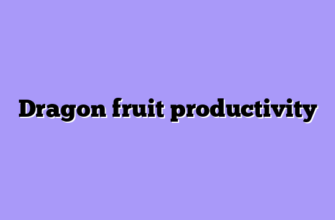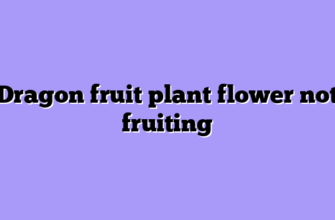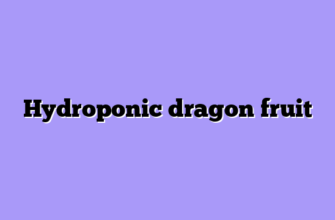Dragon fruit is a delicious and nutritious fruit that is becoming increasingly popular in many parts of the world. It is a great addition to any diet and can be enjoyed in a variety of ways. However, in order to get the most out of your dragon fruit plants, it is important to use the best dragon fruit fertilizer. The right fertilizer can help your plants to grow bigger and healthier, and can also help to increase the yield of your dragon fruit harvest.
In this article, we will discuss the different types of dragon fruit fertilizer available, and how to choose the best one for your plants.
The Benefits of Using Organic Fertilizers for Dragon Fruit
Organic fertilizers are becoming increasingly popular among dragon fruit growers due to their numerous benefits. Organic fertilizers are derived from natural sources such as animal manure, compost, and plant matter, and are free from synthetic chemicals. They are an excellent choice for dragon fruit growers as they provide essential nutrients to the soil and help to promote healthy plant growth.

Organic fertilizers are also beneficial for the environment. They are free from synthetic chemicals, which can be harmful to the environment if they are not used correctly. Organic fertilizers also help to improve the soil’s microbial activity, which can help to reduce the need for chemical pesticides and herbicides.
Organic fertilizers are also cost-effective. They are often cheaper than synthetic fertilizers, and they can be used for multiple seasons. This means that dragon fruit growers can save money in the long run by using organic fertilizers.
Overall, organic fertilizers are an excellent choice for dragon fruit growers. They provide essential nutrients to the soil, help to improve the soil structure, and are beneficial for the environment. They are also cost-effective and can be used for multiple seasons. For these reasons, organic fertilizers are an excellent choice for dragon fruit growers.
The Pros and Cons of Using Chemical Fertilizers for Dragon Fruit
The use of chemical fertilizers for dragon fruit has both advantages and disadvantages. On the one hand, chemical fertilizers can provide a quick and easy way to increase the nutrient content of the soil, allowing dragon fruit to grow and thrive. Additionally, chemical fertilizers can be used to correct soil deficiencies, such as low levels of nitrogen, phosphorus, and potassium.
On the other hand, there are some drawbacks to using chemical fertilizers for dragon fruit. For example, chemical fertilizers can be expensive and difficult to apply correctly. Additionally, they can cause soil erosion and can be toxic to beneficial organisms in the soil, such as earthworms and beneficial bacteria. Furthermore, chemical fertilizers can leach into groundwater, leading to contamination of drinking water sources.
In conclusion, while chemical fertilizers can be beneficial for dragon fruit, they also come with some risks. It is important to weigh the pros and cons of using chemical fertilizers before making a decision.
The Best Time to Fertilize Dragon Fruit
- In the spring, dragon fruit plants should be fertilized with a balanced fertilizer that contains nitrogen, phosphorus, and potassium. This will help the plants to grow and produce healthy fruit. It is important to apply the fertilizer evenly around the base of the plant and to water it in well.
- In the summer months, dragon fruit plants should be fertilized with a high-phosphorus fertilizer. This will help to promote flowering and fruiting. It is important to apply the fertilizer evenly around the base of the plant and to water it in well.
- It is also important to monitor the soil pH of your dragon fruit plants. The ideal pH range for dragon fruit is between 6.0 and 7.0. If the soil pH is too low, you can add lime to raise the pH. If the soil pH is too high, you can add sulfur to lower the pH.
- Finally, it is important to monitor the nutrient levels in the soil. Dragon fruit plants need adequate levels of nitrogen, phosphorus, and potassium to produce healthy fruit. If the soil is deficient in any of these nutrients, you can add a fertilizer that contains them.
By following these tips, you can ensure that your dragon fruit plants are healthy and productive. Fertilizing your dragon fruit plants in the spring and summer months will help them to grow and produce healthy fruit.
How to Make Your Own Homemade Dragon Fruit Fertilizer
Creating your own homemade dragon fruit fertilizer is a great way to ensure that your dragon fruit plants receive the nutrients they need to thrive. With a few simple ingredients, you can make a fertilizer that will help your dragon fruit plants grow strong and healthy.
To begin, you will need to gather the following ingredients: one cup of Epsom salt, one cup of fish emulsion, one cup of kelp meal, one cup of bone meal, and one cup of compost. Once you have all of the ingredients, mix them together in a large bowl. Make sure that all of the ingredients are evenly distributed.

When applying the fertilizer, make sure to water the soil around the base of the plant. This will help the fertilizer to reach the roots of the plant and provide it with the nutrients it needs. You should also water the leaves of the plant, as this will help the fertilizer to reach the entire plant.
Finally, you should fertilize your dragon fruit plants every two weeks. This will ensure that your plants receive the nutrients they need to stay healthy and produce delicious fruit.
By following these steps, you can easily make your own homemade dragon fruit fertilizer. This fertilizer will provide your dragon fruit plants with the nutrients they need to grow strong and healthy.
My Prize-Winning Dragon Fruit Fertilizer Recipe: A Step-by-Step Guide
As a dragon fruit enthusiast, I’ve experimented with countless fertilizer blends to nurture the most vibrant, fruit-laden vines imaginable. After years of trial and error, I’ve perfected my own recipe that consistently yields impressive results. Here, I’ll share the secrets to my success in a simple, step-by-step guide:
Ingredients:
- Epsom Salts: These magnesium-rich salts promote healthy foliage growth and vibrant flower production. You’ll find them easily at most drugstores or garden centers.
- Potassium Sulfate: This potassium powerhouse is essential for promoting flower and fruit development in dragon fruit cacti. Look for it alongside other fertilizers at gardening stores.
- Balanced Fertilizer: A good quality, balanced fertilizer formulated for cacti provides essential nutrients for overall plant health. I recommend a 10-10-10 NPK ratio.
- Organic Compost: Packed with beneficial microbes and nutrients, compost acts as a slow-release fertilizer, feeding your plants over time. Opt for organic, aged compost to avoid introducing unwanted pests or diseases.
Tools:
- Watering Can
- Bucket
- Measuring Spoon
Instructions:
- Measure the Magic Mix: In a clean bucket, combine 1 tablespoon each of Epsom salts and potassium sulfate. Then, add 2 tablespoons of your balanced fertilizer.
- Compost Credit: For an extra boost, add about a cup of organic compost to the bucket. The compost will provide a sustained source of nutrients and improve drainage.
- H2O Power: Fill your watering can with enough water to thoroughly soak the soil around your dragon fruit plants, typically 1-2 gallons per mature plant.
- Stir It Up: Thoroughly mix the fertilizer mixture in the watering can until everything is dissolved.
- Feeding Time: Water your dragon fruit plants with the prepared fertilizer solution, ensuring the solution reaches the entire root zone. Aim to soak the soil evenly but avoid creating puddles around the base of the plant.
Pro Tip:
- Schedule and Strength: Apply this fertilizer recipe every 2-3 weeks during the active growing season, typically spring and summer. During winter, when growth slows, reduce fertilization to once a month or even halt it altogether.
- Listen to Your Plants: While this recipe has proven successful for me, it’s always wise to observe your plants. If you notice signs of nutrient deficiency, such as stunted growth or yellowing leaves, adjust the frequency or strength of your fertilizer accordingly.
By following these steps and keeping an eye on your plants, you’ll be well on your way to cultivating thriving dragon fruit vines that will reward you with an abundance of delicious fruit!
Conclusion
In conclusion, the best dragon fruit fertilizer is one that is specifically designed for dragon fruit plants. It should contain a balanced blend of nitrogen, phosphorus, and potassium, as well as trace elements such as iron, zinc, and manganese. Additionally, it should be applied at the recommended rate and frequency for optimal results. With the right fertilizer, dragon fruit plants can thrive and produce delicious, nutritious fruit.








